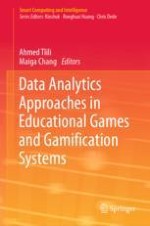2019 | OriginalPaper | Chapter
4. Game-Based Learning Analytics in Physics Playground
Authors : Valerie Shute, Seyedahmad Rahimi, Ginny Smith
Published in: Data Analytics Approaches in Educational Games and Gamification Systems
Publisher: Springer Singapore
Activate our intelligent search to find suitable subject content or patents.
Select sections of text to find matching patents with Artificial Intelligence. powered by
Select sections of text to find additional relevant content using AI-assisted search. powered by
